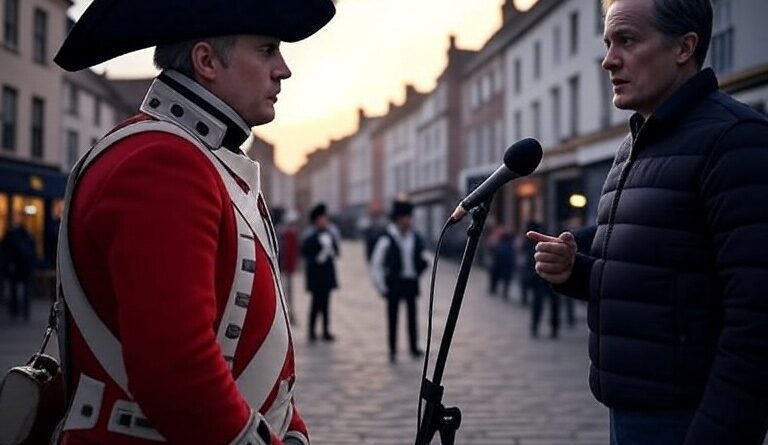UK Free Speech Lessons: 1770s Mistakes to 2025 Unity
A Dream Lost to Ego
Imagine what Britain would look like today if, in the 1770s, we’d ditched the ego and listened to those pesky American colonists. Picture a 2025 United Commonwealth, stretching from London to Boston, where free speech flows like tea in the Thames, trust binds communities, and unity holds nations together. A global superpower, richer than China, culturally unshakeable, with X as a digital town square, not a digital jail. No redcoats bullying printers, no colonies lost, no Union teetering. I’ve seen what happens when voices are stifled—division festers, trust fades. Now snap out of it. It’s 2025, and Labour’s playing King George III, swapping muskets for tweet-cops to jail us for “hate speech” and “incitement”—subjective crimes as vague as a colonial libel law. In 1770, Britain’s ego sent redcoats to silence dissent, losing an empire. Today, Starmer’s hubris risks our trust and unity with speech policing. Have we not learned a bloody thing? These UK free speech lessons still echo.
Soldiers in the Streets
In the 1770s, Britain’s leaders, brimming with imperial pride, thought they could keep the American colonies in line with a show of force—a classic ego-driven governance mistake. After the Seven Years’ War drained the treasury, taxes like the Stamp Act hit colonists’ wallets—and their free speech—by taxing newspapers and pamphlets. Instead of dialogue, London sent 4,000 troops to Boston, a city of 20,000, by 1770. One soldier for every five residents felt like an occupation, eroding public trust in the Crown. The Quartering Act forced colonists to house redcoats, turning neighbors into reluctant landlords. Britain’s ego assumed bayonets would keep the peace, ignoring demands for rights inspired by John Locke. This wasn’t peacekeeping—it was control, fracturing UK national unity and pushing colonists away. These 1770s Britain mistakes show how ego-driven governance fails.
The Boston Massacre’s Spark
That resentment exploded on March 5, 1770, in the Boston Massacre, a turning point in 1770s Britain mistakes. A crowd, fed up with taxes and troops, confronted redcoats, throwing snowballs and jeers. The soldiers, on edge, fired without orders, killing five, including Crispus Attucks. Britain’s arrogance—thinking troops could intimidate without consequence—turned a scuffle into a rallying cry. Printer Paul Revere’s engravings, showing redcoats as villains, spread like wildfire, uniting colonists against threats to free speech and assembly. The Crown expected fear to silence dissent; instead, it shattered trust and fueled a movement, proving ego-driven governance splits rather than unites. UK free speech lessons began here, as colonies bonded in defiance.
The Intolerable Acts’ Overreach
By 1774, Britain’s ego doubled down. After colonists dumped tea in Boston Harbor, the Crown unleashed the Coercive Acts, dubbed “Intolerable.” The Boston Port Act choked trade, hitting economic unity, while the Massachusetts Government Act banned town meetings, handing control to General Thomas Gage. Soldiers raided print shops, targeting editors like Isaiah Thomas for “seditious” pamphlets. Britain’s mindset? If colonists wouldn’t obey, force would make them. That hubris, crushing free speech and assembly, united the colonies in a shared cause. The First Continental Congress formed in 1774, and by 1775, fighting broke out at Lexington and Concord. By 1783, thirteen colonies were gone, lost to an ego that chose troops over talks, fracturing UK national unity. These 1770s Britain mistakes teach enduring UK free speech lessons.
The Digital Dragnet
Fast-forward to 2025, and Labour’s government under Keir Starmer repeats 1770s Britain mistakes with 2025 speech policing. No soldiers patrol, but the same arrogance lingers, using laws to control expression and erode public trust. The Online Safety Act of 2023 aims to keep the internet safe, but its “harmful” content rules are vague, catching more than threats. Platforms like X face fines—up to 7% of global revenue—for not removing posts deemed offensive. In January 2025, a Birmingham student was arrested for an X post questioning immigration, labeled “hateful” despite no clear intent to harm. The case sparked #FreeSpeechUK trending, with 68% of a 2024 YouGov poll saying these laws choke free speech. Labour’s ego assumes it can judge what’s “wrong,” expecting compliance, just like the Crown thought troops could hush dissenters, risking public trust erosion.
Policing Thoughts, Not Crimes
Non-crime hate incidents (NCHIs) take 2025 speech policing further, echoing 1770s Britain mistakes. In 2024, 70,000 were logged—think a Manchester teacher getting a police visit for a private comment on gender policies, or a Leeds man reported for a sarcastic X post. A 2024 Ipsos poll shows 63% of Brits see this as overreach, undermining trust in police as protectors. It’s like redcoats patrolling for loose talk, assuming fear will keep people quiet. Labour’s ego-driven governance bets it can police thoughts without pushback, but it fuels division, especially in Scotland, where debates over autonomy drive 49% independence support in 2025 polls. Public trust erosion and threats to UK national unity mirror the 1770s, showing UK free speech lessons unlearned.
Cracking Down on Protests
Protests face similar overreach, part of 2025 speech policing. The Public Order Act 2023 allows arrests for “disruptive” behavior, a term loose enough to cover roadblocks or rallies. In 2024, 18 climate activists were jailed for blocking the M25, and 12 anti-immigration protesters faced “incitement” charges for slogans, despite no violence. A 2025 Survation poll finds 58% of Brits think these laws curb protest rights. In Scotland, where free speech and autonomy fuel independence talk, this feels like banning town meetings. Labour’s ego thinks police can quiet crowds, just like the Crown thought soldiers could stop gatherings, risking UK national unity. These moves deepen public trust erosion, echoing 1770s Britain mistakes and ignoring UK free speech lessons.
United Commonwealth Vision: A Better 2025
Imagine a 1770s Britain that chose humility, sent troops home, and gave colonists a voice. By 2025, a United Commonwealth vision would link London to Boston, Canada to Australia, in a federation built on trust, unity, and freedom. Free speech would thrive—no Stamp Act, no speech police—with X as a lively forum for ideas, not a police watchlist. A cultural powerhouse would blend American blockbusters with British dramas, uniting global audiences from studios in London and New York. Police would focus on real crime—assaults down 10% here—not tweets or signs, earning trust as protectors, not monitors.
Economically, this United Commonwealth vision would outpace China, with the pound leading and twin financial hubs driving progress. America’s startup energy would merge with Britain’s steady hand, leading in tech and green energy while fostering trust through fair policies. Globally, we’d shape trade and rights, avoiding Brexit’s fractures. Scotland, content with autonomy, would stay united, not eyeing the exit. This vibrant nation—free, trusted, whole—needed humility over ego-driven governance. Instead, 1770s arrogance lost an empire, and 2025’s risks public trust erosion and UK national unity, with Scotland wavering and Reform UK at 18% in polls.
A Past to Learn From, A Present to Shape
The 1770s showed ego’s price: redcoats sent to control colonists cost Britain an empire, birthing an America of bold innovation—think tech pioneers and fearless dreamers. Britain endured, its resilience shining through Shakespeare’s legacy and wartime resolve. Today, Labour’s hubris—policing words, protests, and thoughts—repeats 1770s Britain mistakes, eroding public trust (63% question police overreach) and threatening UK national unity, with Scotland’s 49% independence support signaling cracks. A United Commonwealth vision for 2025 blends America’s drive with Britain’s heart, fostering trust through transparent governance, unity through shared purpose, and freedom through open dialogue. Ego-driven governance lost colonies; let’s not lose faith or fracture our Union. These UK free speech lessons urge humility: talks over handcuffs, trust over control. We didn’t break empires to break bonds—or trade tea in the harbor for a divided nation

